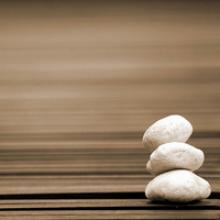Clutter propagates in the dark, it creeps in on little cat feet, and can even destroy lives. Philip K. Dick coined the term "kipple" in his novel Do Androids Dream of Electric Sheep?
"Kipple is useless objects, like junk mail or match folders after you use the last match or gum wrappers or yesterday's homeopape. When nobody's around, kipple reproduces itself. For instance, if you go to bed leaving any kipple around your apartment, when you wake up the next morning there's twice as much of it. It always gets more and more."
We have an interesting relationship to the type and number of objects in our surroundings, one which I think deserves more scientific scrutiny. Look at a picture of a perfectly empty living room in a design magazine and you feel relaxed. Look at a picture of a complete stranger's cluttered closet and you feel trapped, overwhelmed, and exhausted.
(Don't believe me? Click this link to view a Google Image Search for the word "clutter" and see how long you can hold out. I only lasted about two pages of thumbnails before I thought I would have to start breathing into a paper bag.)
Just think about how weird it is to react that way to just pictures! And it's not even pictures of your stuff - it's pictures of other people's stuff.
It is a truism of the decluttering/organizational experts that clutter doesn't just clog your house, it clogs your mental processes as well. Open any declutter book and you'll find anecdotes about people who got promotions and lost weight after they took control of the clutter in their homes. And watch A&E's show "Hoarders" for some excellent examples of the opposite case being true.
I trace our recent obsession with clutter back to the rise in popularity of Feng Shui in the early 1990s. One of the key tenets of feng shui is that clutter is actively disruptive to your life. It is said to impede the flow of energy through your home, the way a pile of rubble impedes the flow of a small creek.
The pinnacle of feng shui is something like a burnished expanse of dining room table, empty but for a small vase that holds a single white orchid. As opposed to what most of us eat dinner off of, which is… not that.
Even if you don't believe in feng shui as literal truth, it carries a lot of weight as a metaphorical truth. Imagine taking a plate of food to that imaginary empty dining room table. You just sit down and eat! No need to stop and stack a bunch of mail together, oops and it slid off the edge, and as you reach for it you knock over a half-empty and flat can of soda, and the next thing you know your dinner's gone cold before you can even clear a space for yourself. Talk about clouding the senses and confusing the mind!
Question of the day: does the clutter in your home reflect your state of mind, or create it?
Photo credit: Flickr/[>miguel>>]
